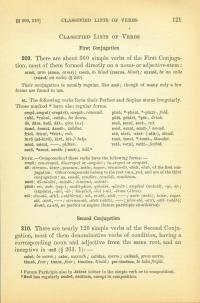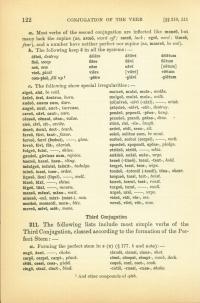209.There are about 360 simple verbs of the 1st Conjugation, most of them formed directly on a noun or adjective stem.
armō arm (arma arms)
caecō to blind (caecus blind)
exsulō be an exile (exsul an exile, § 259)
Their conjugation is usually regular, like amō; though of many only a few forms are found in use.
a. The following verbs form their perfect and supine stems irregularly. Those marked * also have regular forms.
| crepō, crepuī (-crepāvī), -crepit- resound | plicō, * -plicuī, * -plicit- fold |
| cubō, * cubuī, -cubit- lie down | pōtō, pōtāvī, * pōt- drink |
| dō, dăre, dedī, dăt- give (DA) | secō, secuī, sect- cut |
| domō, domuī, domit- subdue | sonō, sonuī, sonit-1 sound |
| fricō, fricuī, * frict- rub | stō, stetī, -stat- (-stit-) stand |
| iuvō (ad-iuvō), iūvī, iūt-1 help | tonō, tonuī, * -tonit- thunder |
| micō, micuī, — glitter | vetō, vetuī, vetit- forbid |
| necō, * necuī, necāt- (-nect-) kill2 | |
Note— Compounds of these verbs have the following forms.
crepō: con-crepuī, dis-crepuī or -crepāvī; in-crepuī or -crepāvī
dō: circum-, inter-, pessum, satis, super, vēnum-dō, dedī, dat, of the 1st conjugation. Other compounds belong to the root DHA (put) and are of the 3rd conjugation: condō, condĕre, condidī, conditum
micō: dī-micāvī, micāt-; ē-micuī, -micāt-
plicō: re-, sub- (sup-), multi-plicō, -plicāvī, -plicāt-; ex-plicō (unfold), -uī, -it- (explain), -āvī, -āt-; im-plicō, -āvī (-uī), -ātum (-itum)
stō: cōn-stō, -stitī, (-stātūrus); ad-, re-stō, -stitī, —; ante- (anti-), inter-, superstō, -stetī, —; circum-stō, -stetī (-stiti), —; prae-stō, -stitī, -stit- (-stāt-); dī-stō, ex-stō, no perfect, no supine (fut. part. ex-stātūrus)
210. There are nearly 120 simple verbs of the 2nd Conjugation, most of them denominative verbs of condition, having a corresponding noun and adjective from the same root, and an inceptive in -scō (§ 263.1).
caleō be warm; calor warmth; calidus warm; calēscō grow warm
timeō fear; timor fear; timidus timid; per-timēsco to take fright
a. Most verbs of the 2nd conjugation are inflected like moneō, but many lack the supine (as, arceō ward off; careō lack; egeō need; timeō fear), and a number have neither perfect nor supine (as, maereō be sad).
b. The following keep ē in all the systems.
| dēleō destroy | dēlēre | dēlēvī | dēlētum |
| fleō weep | flēre | flēvī | flētum |
| neō sew | nēre | nēvī | [nētum] |
| vieō plait | viēre | [viēvī] | viētum |
| com-pleō fill up3 | -plēre | -plēvī | -plētum |
c. The following show special irregularities.
| algeō alsī be cold | mulceō, mulsī, muls- soothe |
| ārdeō, ārsī, ārsūrus burn | mulgeō, mulsī, muls- milk |
| audeō, ausus sum dare | (cō)nīveō, -nīvī (-nīxī), — wink |
| augeō, auxī, auct- increase | (ab)oleō, -olēvī, -olit- destroy |
| caveō, cāvī, caut- care | pendeō, pependī, -pēns- hang |
| cēnseō, cēnsuī, cēns- value | prandeō, prandī, prāns- dine |
| cieō, cīvī, cit- excite | rīdeō, rīsī, -rīs- laugh |
| doceō, docuī, doct- teach | sedeō, sēdī, sess- sit |
| faveō, fāvī, faut- favor | soleō, solitus sum be wont |
| ferveō, fervī (ferbuī), — glow | sorbeō, sorbuī (sorpsī), — suck |
| foveō, fōvī, fōt- cherish | spondeō, spopondī, spōns- pledge |
| fulgeō, fulsī, — shine | strīdeō, strīdī, — whiz |
| gaudeō, gāvīsus sum rejoice | suādeō, suāsī, suās- urge |
| haereō, haesī, haes- cling | teneō (-tineō), tenu, -tent- hold |
| indulgeō, indulsī, indult- indulge | tergeō, tersī, ters- wipe |
| iubeō, iussī, iuss- order | tondeō, -totondī (-tondī), tōns- shear |
| liqueō, licuī (līquī), — melt | torqueō, torsī, tort- twist |
| lūceō, lūxī, — shine | torreō, torruī, tost- roast |
| lūgeō, lūxī, — mourn | turgeō, tursī, — swell |
| maneō, mānsī, māns- wait | urgeō, ursī, — urge |
| misceō, -cuī, mixt- (mist-) mix | videō, vīdī, vīs- see |
| morde, momordī, mors- bite | voveō, vōvī, vōt- vow |
| moveō, mōvī, mōt- move | |


